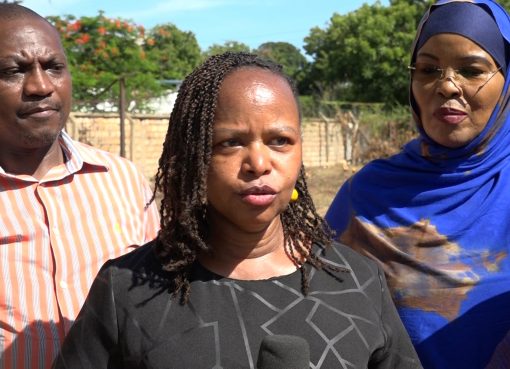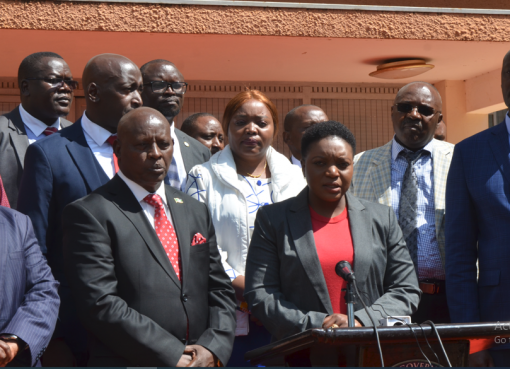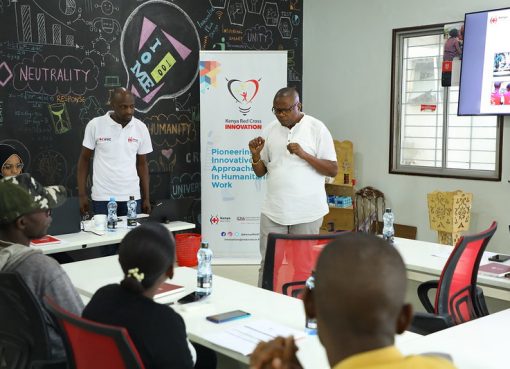For decades, the infamous Salgaa stretch along the Nakuru-Kisumu-Eldoret Highway has been in the news for all the wrong reasons. It has been a notorious black spot that has claimed thousands of lives for years.
The ‘jinxed’ hitherto black spot now appears exorcised and breaking from its tarnished reputation following an announcement by Governor Lee Kinyanjui that 12 more local and multi-national firms had declared their intention to set shop in the area.
Their establishment will add to a growing number of manufacturing enterprises that have set base in the once vast maize and wheat plantations including Royal Group Industries, National Cement Company, Sameer Agriculture and Livestock Limited, Ganglong International, a Chinese company that majors in roofing materials.
To cap it all President Uhuru Kenyatta is expected at Salgaa in a few weeks to inaugurate National Cement a subsidiary of Devki Group, put up at a cost of over Sh2 billion which will offer employment to over 1000 people directly and a further 3000 indirectly.
“The President will be inaugurating the latest industrial entrant into Salgaa. No County has grown without industrialization. This is why the national Government has prioritized the manufacturing sector under the Big Four Agenda.
With its agricultural hinterland Nakuru County is a major source of raw materials for industries. Geographically, the town is centrally located in relation to the rest of the country and is therefore more accessible,” said Mr Kinyanjui.
This will be the first time the devolved unit will be hosting a cement manufacturing concern after Devki Group of Companies rolled out construction of the factory which was completed three months ago.
“For many years Salgaa has been known for its infamous black spots that have claimed hundreds of lives through road carnage. With the expected economic empowerment we are looking forward to great change among the people,” offered the governor.
The company commands over twenty percent of the cement market locally through its flagship Simba Cement brand. It has also cultivated a reputation in the East African region through exports.
Governor Kinyanjui indicated that once the 12 firms add to the already established manufacturing entities at Salgaa, more than 20,000 jobs will be created directly.
“The location of Salgaa, land availability and development patterns are among the factors that have attracted investors here. We have been working with other agencies in both National and County government and the private sector to facilitate potential investors through the establishment of a one-stop desk where they are issued with all the required documentation. We have in place deliberate and predictable policy interventions,” he stated.
Kinyanjui said continued improvement of road infrastructure including construction of two interchanges along the Nairobi-Nakuru-Eldoret and the proposed SGR line to Naivasha will ease transportation to and from the County, which he said is vital for industrialization.
Last year, Sameer Agriculture and Livestock Limited pumped into the county Sh3 billion in its newest factory a few kilometers from Salgaa Trading Center.
The Company’s National Sales Manager, Rajesh Mishra, said the Company was producing three milk variants; full cream, whole milk and low fat milk and different juices.
Apart from providing employment to hundreds of youths, the plant has provided a market for milk from local dairy farmers who are yet to meet its demand.
Nakuru Deputy Governor, Dr Eric Korir, observed that strategic location, land availability, improved infrastructure, friendly tax regimes and legislations and reliable supply of raw materials and labour were among factors that were attracting investors back to the devolved unit.
Among the manufacturing concerns that have seized the opportunity to set shop at Salgaa include Royal Group Industries which in 2018 pumped Sh800 million in a steel factory whose construction is ongoing at a 22-acre piece of land.
The Company’s Director, Yusuf Hassanali, said the project is targeting to offer employment opportunities and market its products within Rift Valley and Western Kenya regions.
“We settled for Nakuru as it is centrally located. Most steel and iron sheet manufacturers are domiciled in Nairobi and Mombasa. We want to fill the void that has been there in western parts of the country.
The investment targets to contribute to the Big Four Agenda on housing by cutting down on costs of transporting building materials,” said Hassanali.
The factory which will be producing steel bars of between 8 and 32 millimeters thickness will engage at least 300 employees at the plant and thousands others in the supply chain.
“We settled for Nakuru as it is centrally located. Most steel and iron sheet manufacturers are domiciled in Nairobi and Mombasa. We want to fill the void that has been there in western parts of the country.
Among the variety of products made at Ganglong International at Salgaa include curved, galvanized, transparent, decra and versatile iron sheets. It also produces ridges and gutters.
The uniqueness of this factory from others dealing with similar products is the opportunity given to all clients to specify features such as size, colour and design of what they need depending on the nature of their construction projects at factory prices.
The once notorious black spot also hosts a number of poles treatment plants and flower farms which offer enormous employment opportunities to the residents.
Kenya Association of Manufacturers (KAM) South Rift Chairman, Jayen Dodhia, described the entry of the factories as a pointer to Nakuru becoming the second most preferred investment destination in the country after Nairobi.
Dodhia added that the upcoming factories have an opportunity to shine and succeed if they produce products of unmatched quality to beat competition from plants based in other cities.
A recent survey on the Gross County Product by the Kenya National Bureau of Statistics had stunning revelations to the effect that Nakuru is the second biggest economy after Nairobi, ahead of bigger cities of Mombasa and Kisumu.
The County’s 6.1 percent contribution to the economy, second to Nairobi’s 21.7 percent may rise further following ongoing and planned industrial developments expected to create more wealth and employment opportunities.
“Salgaa provides a convenient location for logistics and enough space which are attracting the investors,” said Dodhia.
Salgaa residents have welcomed the establishment of industries in the area which previously depended on transit trucks and flower farms.
Secretary to the Salgaa Business Community Andrew Koros indicated that the once sleepy trading centre is experiencing unprecedented growth with land prices soaring at a high rate.
“It is our hope that the factories will absorb the many jobless youths from this area. People have started investing in residential houses which are mushrooming every day as developers’ bank on the anticipated population growth and demand for better housing,” said Koros.
He attributed the scramble by investors to availability of land and strategic location of Salgaa between Nakuru, Kisumu and Eldoret.
By Anne Mwale




